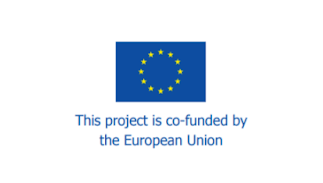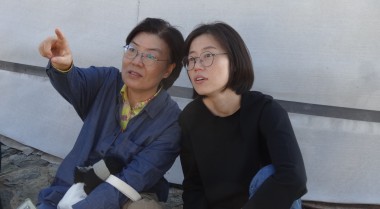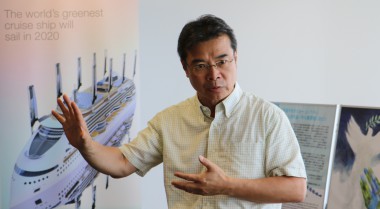
Every voice matters for peace on the Korean Peninsula: Kajita Natsuha and Sasaki Moe on role of youth in peacebuilding in Northeast Asia
In this series, we highlight the diverse voices of people passionately building peace on the Korean Peninsula as part of the Ulaanbaatar Process (UBP). Named after the Mongolian capital in which it was officially launched in 2015, the Ulaanbaatar Process is a unique civil society dialogue for peace and stability in Northeast Asia (NEA). This story features Kajita Natsuha and Sasaki Moe from Japan, who are organizing members of Online NARPI, an open platform for intergenerational dialogue on peace issues led by youth, which is organized in cooperation with GPPAC and the UBP.
Kajita Natsuha is a learning designer and facilitator specializing in language with passion in exploring possibilities in intercultural dialogue and education to promote peacebuilding, social justice, and human rights. As a Master’s student in Education, her research delves into education and peacebuilding in the context of Northeast Asia.
Sasaki Moe is a peacebuilding and development specialist who works in project management, strategic collaboration, and capacity building with a focus on youth in peacebuilding. She is a Steering Committee member of the Northeast Asia Regional Peacebuilding Institute (NARPI), and has facilitated Youth, Peace and Security training activities held as part of the Ulaanbaatar Process. Moe currently lives in London, where she works for Thomson Reuters Foundation.
Why are you so strongly motivated to work with young people from Northeast Asia?
Moe: Our narrative and definition of peace in NEA is very much led by our older generation, which experienced WWII. The culture of learning from elders is wonderful, but it is very rare to hear what young people themselves think about what peace should or could be. I think by bringing young people’s voice into this conversation, we receive more diverse perspectives of what peace is for a country and a region.
Natsuha: It is really important to make peacebuilding and conversations about peace inclusive and accessible, especially to youth being a key group that needs to be heard as actors who will continue to build the future of the region. I think reimagining our peacebuilding space with young people can encourage their sense of ownership and confidence to engage more.
Your innovative engagement with young people and energy invested is amazing; what do you hope to achieve through the Online NARPI dialogue sessions?
Moe: We are creating a space where people can come with interest to share and to learn. Such open and free spaces to talk about peace in our region can be difficult to find in Japan and in the region. We create a safe space where young people can work on confidence building and express their ideas and opinions on various personal, social and political issues.
Natsuha: In Japan, when something uncomfortable happens, it may often feel like we are supposed to hold back and swallow it down. With this convention and having few opportunities for dialogue, people might feel unfamiliar with or discouraged from voicing their feelings and thoughts, especially when it comes to social and political issues. In our online platform, we have talked about everyday issues of peace and conflict, including militarization, identity and broken relationships at personal, national and regional levels. This can help us find a voice in the social and political discomforts we feel and take the first step to start acting for change.
UN Security Council Resolution 2250 was the first-ever thematic resolution on youth, peace and security, celebrating its 7th anniversary in December. Is this resolution important for your work?
Moe: By officially identifying young people as an important demographic and actor in peacebuilding, we felt encouraged to declare our role in peacebuilding. Our youth-led initiatives and opinions have more legitimacy now. One challenge is that the Resolution's focus is on regions that have ongoing open conflicts. Its appeal is a bit detached from the NEA context. For example, when looking at official statements from the Japanese government on their commitment to the YPS agenda, their commitment is to support the role of youth internationally, and there is little to no mention of the importance of the agenda domestically or of self-reflection.
You both lived in Europe and know EU politics well. How do you see the cooperation between the EU and GPPAC NEA in peacebuilding and regional dialogue?
Natsuha: I believe local ownership of peacebuilding in the regional context is essential. At the same time, peacebuilding is a transregional effort that goes beyond local borders to be forwarded collectively and universally. In this sense, it is meaningful to connect across localities and explore possibilities of peacebuilding through learning about initiatives in different contexts, including between Europe and NEA. From the context of Europe, as examples, we could consider active citizenship, collaboration across countries and areas, and how people have dealt with historical conflicts.
Moe: There is a kind of expectation for young people to take on democracy and peace processes as if we were European young people who grew up with the concept of protecting and declaring our individual human rights - speaking truth to power. While I do believe such principles are universally important, the way in which we protect and forward them must make sense to our culture. As young people who want our voices heard, we cannot simply take on Western practices, but we can find inspiration in the powerful voices of young people in Europe and find our own voice and process that makes sense in our cultures that place significance in respecting our elders, responsibility, and obligation. Online NARPI tries to question structural violence and rediscover new ways of cross-generational dialogue to create spaces where older and young people can come together and develop relations of co-learning and transformation. When all feel welcome to share their perspectives, it is more comfortable for young Asian people.
NEA currently has a tense political situation in which war is always a threatening possibility. What could young people in NEA do to reduce these tensions? What could be their role in peacebuilding?
Natsuha: Especially during the past few years, I met many young people who are concerned about the situation in the region, in virtual spaces, including Online NARPI. To me, it was and still is very important to connect with other like-minded yet diverse young people, to share our concerns and ideas, to move beyond fear and find hope in what we can do using our connections and initiatives. Building interpersonal connections with others in different places helps us relate to them and stay connected to what is happening. It is critical for us to connect as much as possible to keep communicating, to not give in to fear but to forge solidarity.
Moe: I see an increased push for militarization in our region. We have continuous discussions in Japan about military capacity and the fear of needing an army. However, there is little information about how these changes, if made, will affect the lives of young people. We, the young people, are what is required to fuel military expansion. I, for one, do not wish this future on myself, my sisters, my brothers, or my children. As young people, we must call for leaders to consider young people in their policy decisions and be transparent about how their decisions will affect us.
For more reflections from Moe and Natsuha, including how their efforts to ensure youth leadership in peacebuilding in Northeast Asia, please read their chapter in the publication issued in September 2022 as part of the Ulaanbaatar Process here: Youth Inclusion that Starts from Reimagining Leadership, in Peace and Security in Northeast Asia – The New Normal?

This article was prepared in the frame of the project "Ulaanbaatar Process: A Civil Society Approach to Building Peace in Northeast Asia", implemented by Peace Boat and Blue Banner, in cooperation with the GPPAC Foundation, co-funded by the European Union.

